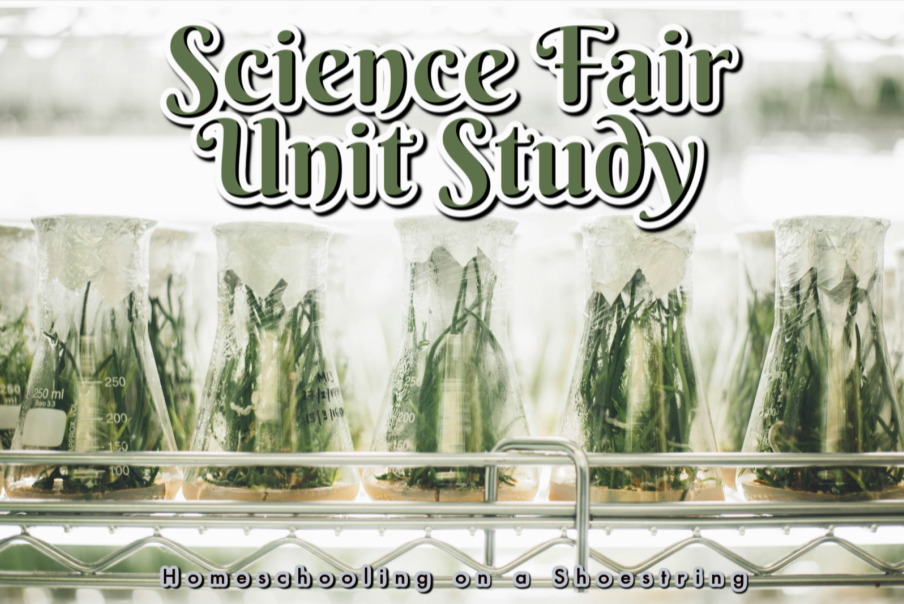
Science Fair Unit Study
This unit study helps students plan, organize, and complete a science fair project from start to finish. It includes vocabulary, book recommendations, project idea banks, planning tools, display board tips, and evaluation ideas. Unlike a general science unit, this resource focuses on hands-on experimentation and clear communication—skills needed for real science fairs. If you’re preparing for a homeschool showcase or a 4-H competition this summer, now’s the time to dive in. This unit will guide you from early brainstorming to final presentation.
The unit is suitable for grades K–12, with flexibility to adapt based on your learners’ ages and abilities. Please preview links and activities to ensure they are appropriate for your family. New resources will be added as time allows.
Many of the links below lead to printable resources that can be added to a notebook or lapbook for this study.
How to Use This Unit
This isn’t a full curriculum, but it can help you guide your student through the science fair process. Here’s one way to use the materials below:
- Start with the vocabulary section to review important terms.
- Pick a book or two from the list that matches your child’s interests or project type.
- Use the project idea banks to brainstorm topics. Have your student write down 2–3 possible questions.
- Help them choose one and begin planning. Use worksheets to organize thoughts, research, and steps.
- Refer to the display board section once the project is complete to prepare for presentation.
- Use the evaluation tools to review what worked, what didn’t, and what they learned.
Learning Objectives
- Develop a testable science question based on personal interests or everyday observations.
- Apply the scientific method by designing and carrying out a simple experiment at home.
- Track and analyze results using age-appropriate data recording and observation tools.
- Create a science fair display that clearly communicates the project’s process and outcome.
- Practice explaining the project verbally to others, including the reasoning behind the experiment and what was learned.
- Use provided resources to reflect on what worked, what didn’t, and how to improve for future projects or presentations.
Vocabulary
| Abstract | A summary of the entire experiment. |
| Conclusion | A summary of the results and what they mean. |
| Constant | The part of the experiment that stays the same. |
| Control Group | The group in an experiment that does not receive the change, used as a baseline for comparison. |
| Data | Facts, figures, or observations collected during an experiment. |
| Dependent Variable | The part of the experiment that changes as a result; what you measure. |
| Experiment | A step-by-step process used to test the hypothesis. |
| Hypothesis | An “if…then” prediction about the experiment you are testing. |
| Independent Variable | The part of the experiment that “I” the scientist change. |
| Inference | An explanation of why you think you got the results you did, based on your observations. |
| Problem | A research question you want to explore. |
| Procedure | The detailed steps followed to carry out the experiment. |
| Research | Information gathered about the topic you are studying. |
| Variable | Something that can change in an experiment. |
Book Resources
- Science Fair Handbook by Judy Bundy and Julianne Blair Bochinski
- The Complete Handbook of Science Fair Projects by Julianne Blair Bochinski
- Awesome Science Experiments for Kids: 100+ Fun STEM / STEAM Projects and Why They Work by Crystal Chatterton
- Janice VanCleave’s Guide to More of the Best Science Fair Projects by Janice VanCleave
- Science Fair Bunnies by Kathryn Lasky (picture book – fun intro for younger students)
- Science Fair by Dave Barry and Ridley Pearson (humorous middle-grade fiction with science fair chaos)
- How to Build a Better Mousetrap: Science Fair Projects for Inventive Thinkers by Bonnie Biafore
- How to Be a Successful Science Fair Project by Julianne Blair Bochinski
- Science Fair Success: Getting to the Top by Joe Rhatigan
- The Complete Workbook for Science Fair Projects by Julianne Blair Bochinski
- Janice VanCleave’s Guide to the Best Science Fair Projects by Janice VanCleave
- Science Fair Winners: Bug Science: 20 Projects and Experiments about Arthropods: Insects, Arachnids, Algae, Worms, and Other Small Creatures by Karen Romano Young
Educator Tools
Project Ideas, Pickers & Planning Help
- Neuroscience for Kids – Themed experiment ideas with a brain science twist
- All-Science-Fair-Projects.com – Searchable database of science fair project ideas by topic and grade
- Science Fair Adventure – Idea generator with topic picker and project planning tips
- Julian Rubin’s Science Fair Guide – Massive index of categorized project ideas and external resources
Display Board & Poster Help
- Science Buddies – How to Make a Display Board
- ThoughtCo – Tips for Science Fair Posters
- The Classroom – Assembling a Science Fair Display
Worksheets
Make your own worksheets with these worksheet creation tools:
- SchoolHouseTech https://www.schoolhousetech.com/ This company gives away two free software worksheet factories one for Basic math and one for wordsearch utility that will make wonderful complements to this unit when you include the clipart listed in the clipart section.
- Start Write – This program makes nice reports and handwriting worksheets for the unit. https://www.startwrite.com/
- TeachNology has several online worksheet makers and a ton of Rubric makers. Rubrics work great with Homeschool Tracker because they give you total points and you count up exactly how many points your child gets. https://www.teach-nology.com/worksheets/
- Online Crossword Puzzle Maker to use with your vocabulary words or locations or even dates from the timeline. https://www.happychild.org.uk/wks/english/ssm/crosswords01.htm
Evaluation Ideas
Assemble a three ring binder and please include:
- A copy of this unit
- Course Description (Highschool Students)
- Write a summary about books read for the unit
- Write an essay on the various topics discussed
- Your Lapbook created for the unit (K-8 Students)
- Any worksheets or activity books created with SchoolhouseTech Software https://www.schoolhousetech.com/
- Your journal and its contents
- Your Log of activities from Homeschool Tracker https://www.homeschooltracker.com/free-homeschool-tracker-basic-edition Its Free!
- Your Timeline
Unit Safari originally compiled July 2009. Fully updated and restructured in 2025.
![]()

2 Comments
Kandas
Another comprehensive study guide.
Angie Vallejo
This is a fabulous guideline for science fairs! Wish we had this when my son did his!